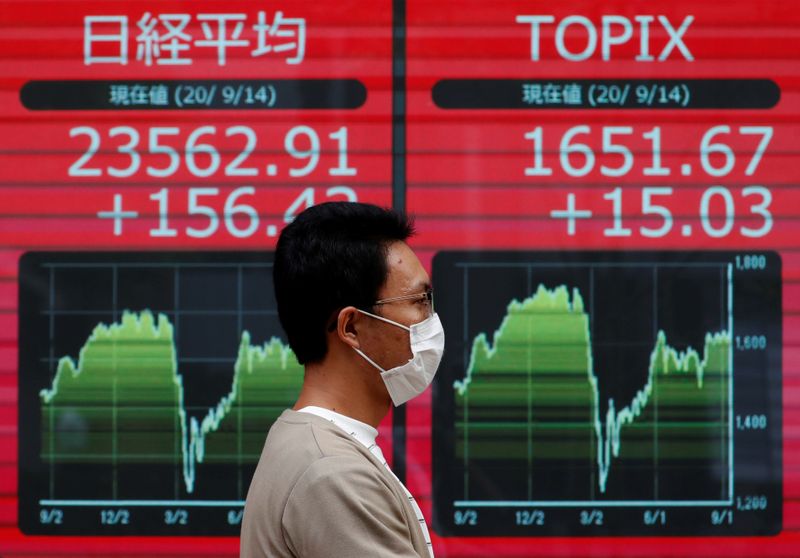By Anshuman Daga
SINGAPORE (Reuters) - Asian equities advanced on Tuesday and the dollar slipped, with investor sentiment supported by Chinese data and optimism about COVID-19 vaccines.
MSCI's broadest index of Asia-Pacific shares outside Japan (MIAPJ0000PUS) rose 0.5%, for a fourth straight day of gains, up nearly 3% so far this year.
E-Mini futures for the S&P 500 (ESc1) put on 0.2%, reversing early losses, while EUROSTOXX 50 futures (STXEc1) eased 0.2%.
Chinese blue chips added 0.7% (CSI300), buoyed by data showing China's industrial output rose 5.6% in August from a year ago, expanding for a fifth straight month. The yuan climbed to a 16-month high.
"The activity data today shows that the recovery in the private sector gained momentum in August. The recovery in China has become more balanced and broad-based," HSBC economists said in a report.
Japan's Nikkei (N225) shed 0.5%, while South Korean shares (KS11) were 0.5% higher and Australia's S&P/ASX 200 index (AXJO) eased 0.2%.
Japanese Chief Cabinet Secretary Yoshihide Suga won a ruling party leadership vote, paving the way for Japan's first change of leader in nearly eight years.
Strategists expect Japanese equities to take support from Suga's win.
"He's seen as someone who's particularly stock market friendly. The fact that we've got political certainty for the next two years from someone who's connected to the free market is going to be good news for Japan," said Jim McCafferty, joint head of Asia Pacific equity research at Nomura.
E-Mini futures for the S&P 500 (ESc1) slipped 0.3%, while EUROSTOXX 50 futures (STXEc1) eased 0.2%
So far this year, gains in Asia have been led by technology stocks.
"From an asset class point of view, if you require to generate any income from your investment portfolio, then equities is one of the few places you can do that because bond yields are so low," said McCafferty, who prefers North Asian companies due to their stronger balance sheets.
He said investors who didn't want to pay lofty valuations of U.S. stocks could look to fast-growing tech companies in Taiwan and South Korea.
U.S. retail sales figures from August are due Wednesday.
Investors will also look to central banks for direction, with the U.S. Federal Reserve starting a two-day policy meeting on Tuesday, the first since unveiling a landmark shift to a more tolerant stance on inflation in August.
The Bank of Japan and the Bank of England announce their respective policy decisions on Thursday.
Markets will be focused on projections from Fed policymakers on the U.S. growth outlook and on any details about what the bank intends to do to encourage inflation.
The Dow Jones Industrial Average (DJI) closed up 1.2% and the S&P 500 (SPX) rose 1.3% while the tech-heavy Nasdaq Composite (IXIC) added 1.9%.
"We remain neutral stocks versus bonds as we balance extended equity valuations, fading fiscal support, and upcoming U.S. election risks against still ultra-low interest rates and a gradually improving economic environment," analysts at T. Rowe Price said in a global asset allocation report.
U.S. stocks gained after drugmaker AstraZeneca (L:AZN) said it resumed its British clinical trials of its COVID-19 vaccine, one of the most advanced in development.
The dollar index (=USD) slipped to 93.029, dipping further from a one-month high of 93.664 touched last week. The euro ticked up to $1.1867 (EUR=), having gained for four straight sessions until Monday.
Against the safe-haven yen, the dollar traded at 105.73 yen
Brent crude (LCOc1) was down 0.2%, at $39.5, reversing earlier gains. U.S. West Texas Intermediate (WTI) crude futures (CLc1) were down 0.1% at $37.2 a barrel.

Gold prices